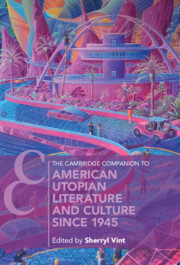Book contents
- The Cambridge Companion to American Utopian Literature and Culture since 1945
- The Cambridge Companion to American Utopian Literature and Culture since 1945
- Copyright page
- Contents
- Figures
- Contributors
- Introduction
- Chapter 1 Pandemics and the Lesson of History
- Chapter 2 American Futures
- Chapter 3 Engendering Utopia
- Chapter 4 America and/as White Supremacy
- Chapter 5 American Spirituality
- Chapter 6 Black Escapes and Black Wishlands
- Chapter 7 Latinx Belonging in New World Borders
- Chapter 8 Educating Desire
- Chapter 9 Utopia after American Hegemony
- Chapter 10 Technological Fantasies
- Chapter 11 Utopian Spaces
- Chapter 12 Environmentalism and Ecotopias
- Chapter 13 Economic Justice
- Chapter 14 Renewing Democracy
- Chapter 15 The Time of New Histories
- Works Cited
- Index
- Cambridge Companions To Literature
Introduction
Utopianism in Dark Times
Published online by Cambridge University Press: 09 May 2024
- The Cambridge Companion to American Utopian Literature and Culture since 1945
- The Cambridge Companion to American Utopian Literature and Culture since 1945
- Copyright page
- Contents
- Figures
- Contributors
- Introduction
- Chapter 1 Pandemics and the Lesson of History
- Chapter 2 American Futures
- Chapter 3 Engendering Utopia
- Chapter 4 America and/as White Supremacy
- Chapter 5 American Spirituality
- Chapter 6 Black Escapes and Black Wishlands
- Chapter 7 Latinx Belonging in New World Borders
- Chapter 8 Educating Desire
- Chapter 9 Utopia after American Hegemony
- Chapter 10 Technological Fantasies
- Chapter 11 Utopian Spaces
- Chapter 12 Environmentalism and Ecotopias
- Chapter 13 Economic Justice
- Chapter 14 Renewing Democracy
- Chapter 15 The Time of New Histories
- Works Cited
- Index
- Cambridge Companions To Literature
Summary
This chapter provides an overview of the importance of utopian theorizing in the twenty-first century. It resituates utopianism, through Blochean theory, as larger than a literary genre and more diverse than representations of perfect societies. Rather, it celebrates an ideal of the utopianism of the everyday, of the here-and-now as much as of the future. It argues for a utopianism that is necessarily decolonial as it seeks to undo the damage of racial capitalism and provide imaginative resources for living differently. It concludes with an overview of the chapters collected in this book, showing that they explore both reactionary or nostalgically inflected visions of America’s settler-colonial utopian foundations, as well as centering new strains of utopian thought emerging from the margins of hegemonic American culture.
- Type
- Chapter
- Information
- Publisher: Cambridge University PressPrint publication year: 2024

